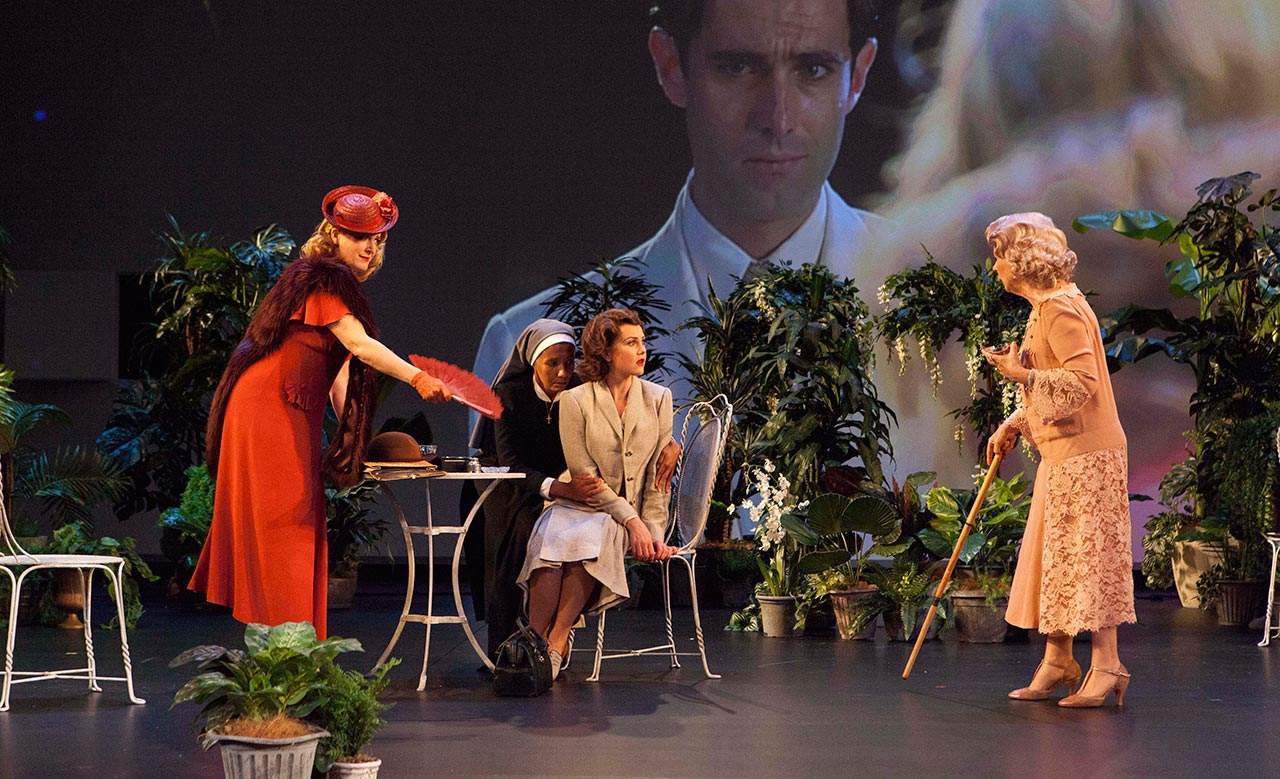Suddenly Last Summer - Sydney Theatre Co
A struggle between cinema and theatre takes place in Tennessee Williams' threateningly overgrown greenhouse.
Overview
Sometimes eye-opening, sometimes distracting, sometimes just 'meh', cameras have become a common sight on the Australian stage. Recently, Belvoir’s production of The Glass Menagerie used them to great effect, exploring the limitations of personal memory. At key points, the cameras captured and cropped the events onstage. When this footage was projected onto two large screens above the set, the feed the audience saw was completely distorted; it was decontextualised, romanticised and bore only the slightest relation to the scene we were witnessing. This was both innovative storytelling and a means of reconciling a work which writer Tennessee Williams, through the protagonist, had claimed was simultaneously truth and sentiment.
In STC’s production of Williams’ Suddenly Last Summer (directed by an unrelated Williams, Kip), a similar fusion is attempted, albeit for different reasons. Unfortunately, a more hamfisted approach means that despite strong performances, the events unfolding on stage feel like a sideshow, collateral damage of the true spectacle — a struggle between cinema and theatre.
The play takes place in the lavish New Orleans estate of Violet Venable (Robyn Nevin), a wealthy older woman struggling to come to terms with the loss of her son Sebastian, who died overseas in mysterious circumstances. Mrs Venable has long contended that the account of his travelling companion and the last person to see him alive, Catharine Holly (Eryn Jean Norvill), is not only false but slanderous. Summoning a number of people, including a young psychosurgeon (Mark Leonard Winter) and Holly herself to the estate, she sets about extracting the truth.
The extended and very dramatic nature of the explanation, coupled with the roomful of shocked onlookers, means that this occasionally feels like Murder on the Orient Express, but the script is unsettling and the cast emanate a tangible sense of dread. Nevin, though confined to a chair for much of the play, is simultaneously wolfish and austere as Mrs Venable. Norvill is wonderful as Catharine, a woman who can’t be certain of anything except the terrible event she witnessed, and Melita Jurisic adds to the almost Lovecraftian nature of the piece with her weird, bewildered turn as Venable’s maid, Miss Foxhill.
The shortcomings of Suddenly Last Summer lie in Williams’ decision to film the play live with a camera crew who move freely about the stage, walking in and out of each scene. The text is relatively naturalistic and places a high priority on creating an unsettling, anxious atmosphere. This is achieved in the first scene, which is filmed entirely out of view. Sebastian’s overgrown greenhouse, referred to as a "well-groomed jungle", is made chaotic and threatening by the cameras. Talk of lobotomies and Mrs Venable’s remembrance that her son equated the face of God with baby turtles shredded by gulls on the Galapagos Islands establishes a creeping horror.
Then the wall shifts. Where before there had only been glimpses of the camera crew, they are now in full view and the shroud of terror falls. Our reality and the reality of the play begin to butt heads and the plight of Catharine Holly fades in importance. Putting technicians next to performers is like putting live animals on stage. With no investment in the constructed reality of the stage, their honesty is inherently more interesting to watch than the assumed characters of the performers.
Their presence does allow for an exploration of the cinematic nature of Williams’ work, but in doing so, they become the piece. The production is no longer a Tennessee Williams play but a play about the making of a film of a Tennessee Williams play. In this context, the fate of the characters becomes rather arbitrary and a strange new dynamic is created, whereby half of the people onstage wail and rage at each other while the other half remain uninvolved and unmoved, content to witness these events through the lens of a camera.
Although the concluding scenes are an impressive marriage of cinematography and staging which work to give the ending real punch, Suddenly Last Summer’s cinematic and theatrical elements spend so much time straining against each other that by the time the ending is reached, this struggle has already done irreparable damage to the whole.





